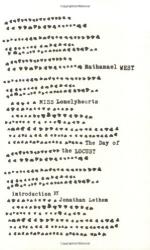|
This section contains 265 words (approx. 1 page at 300 words per page) |

|
Called a "moral satire" and a "moral detective story," the book rearranges a good many techniques to create its own vision. The effaced narrator fills out the barren style with grotesque and surrealistic imagery and jokes that undermine what a reader takes for granted. In addition, as West said, "Violent images are used to illustrate commonplace events. Violent acts are left almost bald." This distortion of common expectation tends also to cast doubt on the novel's world even while individual bits of it are implacably vivid — a paradox which mirrors Miss Lonelyhearts' confusion. Psychology used like myths rather than as explanation undermines preconceptions about characters' thoughts and motives; the characters, thinned of cliche, consist almost entirely of insights. So, too, comic wit, joking, and irony, especially Shrike's, are used to deny comfort, not — as is normally expected — to reinforce it. In a sort of parody...
|
This section contains 265 words (approx. 1 page at 300 words per page) |

|




